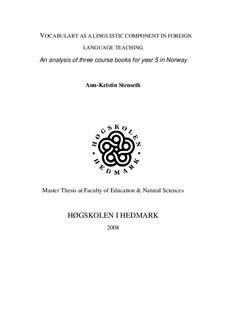Vocabulary as a linguistic component in foreign language teaching. An analysis of three course books for year 5 in Norway
Master thesis
Permanent lenke
http://hdl.handle.net/11250/132302Utgivelsesdato
2008Metadata
Vis full innførselSammendrag
English: The views on both the position and type of vocabulary teaching have changed over the years. The development of the different teaching approaches has been influenced by the trends in general linguistic theory. Research and needs among linguists and teachers lead to the approaches that seemed most suitable for second or foreign language teaching in each period they were being used. The treatment of vocabulary in the different teaching methods can be divided in two kinds: how to learn or acquire new words (teaching methods), and what kind of words to teach (criteria for vocabulary selection). A common feature of all the methodologies, with the exception of the Reading Method, is that they hardly address vocabulary in any principled way. During the first part of the twentieth century, several scholars wanted to lighten the student’s vocabulary learning. They wanted to present common vocabulary first and limit the number of new words in any text. As a result of this thinking, the General Service List was published.
The development of what words to teach have changed drastically during the years. The more recent teaching approaches have focused on useful words and everyday vocabulary. The words were supposed to have a function to allow the student to communicate or get a message through in real life. The teaching of English as a foreign language has changed from being an intellectual exercise to a tool in communication in our everyday life.
The latest English curriculum (LK06) in Norway is clear evidence of how this subject has developed. LK06 is in accordance with an important principle in the work of the Council of Europe, to specify the objectives of teaching at definite stages in the school systems. There is no recommendation to any particular teaching approach. English is now seen as one of the central subjects, and an important tool in our global communication. Daily communication in many jobs and in higher education is in English, and the school system in Norway has therefore a responsibility to make the pupils as proficient users of English as possible, and to be in accordance with international demands.
Beskrivelse
Mastergradsoppgave i kultur- og språkfagenes didaktikk, Avdeling for lærerutdanning og naturvitenskap, Høgskolen i Hedmark, 2008
